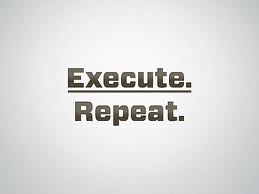Ideas vs execution. Is one the golden boy and the other the black sheep? Over the last few years, I have read various contrasting opinions by prominent industry thinkers on which is more crucial in one’s quest to change the world. Contrary to these wild notions, they are both interlinked and are both core pillars of any booming business. Why does everyone want a dichotomy: black or white?
Ultimately, a good idea can be executed by seasoned entrepreneurs such as Oliver Samwer with impressive results or by poor executers (Andrew Mason, too soon?!) with more of an “aftermath” effect. It’s much more difficult to turn a average idea into a billion dollar company even with one of the most experienced leaders at the helm of the ship. Having a ridiculous idea (though still good) on the other hand is the way to Techwood stardom (new term for the rise of young tech stars in Silicon Valley who are almost as famous as their Hollywood peers, not a sexual reference). Think of Airbnb, if you had heard this idea before it became the behemoth it is today, what would you have thought? Crazy?
Here are two contrasting opinions from a few chaps you might have heard of:
“To me, ideas are worth nothing unless executed. They are just a multiplier. Execution is worth millions.” – Steve Jobs (The guy from Apple)
“This is how you can state, with complete confidence, that ideas are always and everywhere more valuable than their mere execution.” – Ron Barker (That famous writer and founder of VeraSage Institute)
So, who on earth is right? Whose side are you on? There you have it, you’re damned if you do and damned if you don’t. Who would have fancied telling Steve Jobs that he was wrong? Not I, thank you very much. So is Ron Barker right?
Well, the good news is that you guys have the pleasure of debating this one out. I’m not in the mood for scientifically proving which one is more important, it’s just too late in the day. What I am falling over myself to talk about is ideas; how does one generate a bazillion dollar idea and what pills can you take to become more intelligent and to develop better ideas? Ok, maybe not that last one.
I’m forgetting myself; ideas didn’t win, now did they? I will also discuss a little teeny-weeny bit about execution and the things to look out for along the way.
First stop: cha ching, I have the next Facebook!
Generating a good idea isn’t easy. I would love nothing more than to fall over in the street, hold that, in the park, and stand up with the most disruptive, groundbreaking, billion-dollar business in my head. I think most entrepreneurs will agree with me that this only happens on the occasional Friday. The generation of ideas takes work, a lot of bashing your head against the wall and a considerable amount of research and validation. However, the flow of ideas gets easier as time goes on. Like everything in life, practice makes perfect. Train that brain to be a Samurai warrior of idea generation. The more time you spend writing down ideas the easier its gets and ultimately the more superior the results will be.
So 6 months from now you should have about 6000 ideas written down. Not bad, eh? And after some careful and diligent deliberation, you will have whittled the selection down to a few exceptional ideas. I do recommend, however, that before you choose your idea, get too excited, quit your job and extract all of your savings, that you consider some of the following points:
1) Is your idea solving a real problem that exists, is it disruptive? – Let’s take Warby Parker as an example. The problem that existed before was that there were limited options to buy high quality, stylish prescription glasses at an accessible price. Large monopolies held the market by hostage offering designer glasses at €300 a pair. Warby Parker launched with exceptional marketing and a well-designed product at €75 a pair, thus solving the problem and completely disrupting the market. Does your idea do the same?
2) Even if you turn your idea into a company, is anyone going to be interested? Is there an opportunity? – Research. Look at the market size. Don’t go over the top here, there aren’t many €500 Billion markets. Try to present the market logically, from bottom up.
3) Who is going to try and run you into the ground when you eventually launch? Check your competition. Is the market crowded? – Who is currently in the space, are they big players, how are they positioned, how are they going to try and kill you, how are you different, is the market saturated and the list goes on.
The below points you can start thinking about later down the line once your have more precisely defined your idea, quite possibly after a café con leche or two.
4) How are you going to monetize your idea? – For some reason, Silicon Valley paints a picture of a startup world where monetization isn’t as inherently important as it is here in Europe. We are creating a business right?
5) What is your customer acquisition strategy? – What engine of growth is driving your business model? Viral, paid or sticky?
6) How much capital do you need and how are you going to raise it?
7) What is your exit strategy? – Are you looking to be acquired, if so to whom? Have an idea and start making contacts. IPO?
Aim for an industry that needs disrupting. Look for out of date business models and complacent incumbents in spaces that can be improved. More than anything try and find something you are passionate about. If you don’t have a Ph.D in passion (thanks Vooza!) then the chances of you succeeding jump right out the window (sin paracaidas). Oh yeah, and don’t be stupid like I have been in the past, make sure you write your ideas down, whether on your body parts, in Evernote, or on some (clean) toilet paper, just get it down. How many times have you had an amazing “the next big thing” idea, gone to visit your other half at the pizza parlor, done a little surfing and then completely forgotten your idea? Anyone? Bueller? Also don’t freak out (too much) if you find out that someone else has the same/similar idea to you, this is healthy. It’s a good sign that the there is a market for you to enter. In fact, this happened to me the other day, Biz Stone, you stole my idea the day after I thought about it (Jelly)! I’d be more worried if I was going into an unknown market that nobody had ever thought about before.
This is why you have to be better than everyone else and execute like a daemon.
Just one more thing about ideas, apologies I know this is getting long and you probably have to watch the next episode of Game of Thrones. The tech world is obsessed with the Lean Start Up Methodology right? Right. I am too (to a certain extent). Without delving too much into the foundations of the lean startup, it’s important to know that if you adopt this methodology (which I think you should) be prepared for change. It’s extremely likely that your original idea won’t be the same one you finish up with. Don’t lose your vision, just be flexible.
Execute or be executed
Correct execution is the result of intelligent strategies, positive motivation, a never give up attitude, some luck and a myriad of other factors. A lot of the skill sets that help with successful execution come from experience, learning from your mistakes and from your peers. But hold on, shit, this is my first startup… I don’t have experience, how am I going to execute?! Don’t worry! Plenty of first time entrepreneurs have made it big; look at Jack Dorsey or Mark Zuckerberg. But these are massively experienced entrepreneurs you tell me. 10 years ago they weren’t and Twitter and Facebook were their first ventures. If they can do it, why can’t you? Just be prepared for some hard labour and tears along the way.
I’ve complied a lovely little list of recommendations to help you on your adventure.
1) Validate your idea – be lean; build, measure and learn. Do it all again. See what works, what doesn’t. Focus on what works. Listen to the RIGHT metrics.
2) Believe in what you are doing and be passionate – if you don’t believe in your idea, how can you expect anyone else to?
3) Leave your ego at the door – listen to your mentors, don’t resist positive change, if the numbers and your mentors say its time to pivot then its time to pivot. I know your idea is your baby and its amazing and everything but think of it as your baby just having a little makeover.
4) Watch your burn rate – know your numbers, know what you can afford and what you can’t. Know how far your money can get you.
5) Find good talent – You’ve heard it a thousand times, but surrounding yourself by A-players will help you create a winning culture and a solid company.
6) Lead by example and commit – if you’re out sipping cañas all day long while the rest of your office is pulling all-nighters, that doesn’t show great leadership. Lead by example.
7) Never give up – listen to Elon Musk (Founder of Paypal, Telsa Motors, Space X) “I will never give up and I mean never.”
So with these ultimate tools and tips you are now ready to create the next big thing. Whether it’s an app that builds real people (like in Weird Science) or the solution to global warming, these guidelines will give you the foundations for getting there. Do something you are passionate about and don’t just chase the money.
Most of all, never give up!
Photo credits










[…] idea isn’t worth anything without its execution. Ever wonder how startups at the idea phase can raise huge seed rounds from renowned investors? […]